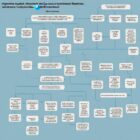Why Are Certain Individuals Eligible for Medicaid Application?

Did you know that over 75 million Americans rely on Medicaid for their healthcare needs?
If you’re wondering why certain individuals are eligible for Medicaid application, this article will provide you with all the answers.
From income requirements to citizenship criteria, we’ll delve into the various factors that determine eligibility for Medicaid.
So if you’re curious about who qualifies for this vital healthcare program, keep reading to discover the key considerations.
Key Takeaways
- Medicaid eligibility is determined by comparing income to the federal poverty level (FPL).
- Asset limits, including cash, bank accounts, investments, and real estate, are considered when applying for Medicaid.
- Medicaid benefits are provided to U.S. citizens or qualified non-citizens who meet certain criteria.
- Eligibility for Medicaid varies based on income, age, disability status, and pregnancy, among other factors.
Income Requirements for Medicaid Eligibility
To determine your eligibility for Medicaid, the program takes into account your income level. Medicaid is a government-funded healthcare program that provides medical coverage to low-income individuals and families. The income requirements for Medicaid eligibility vary from state to state, as each state has its own guidelines and thresholds.
In general, Medicaid eligibility is determined by comparing your income to the federal poverty level (FPL). The FPL is an income threshold set by the federal government that varies depending on the size of your household. If your income falls below a certain percentage of the FPL, you may be eligible for Medicaid.
The income limits for Medicaid vary depending on factors such as household size, age, disability status, and whether you’re pregnant or have children. Some states have expanded their Medicaid programs to cover individuals with incomes up to 138% of the FPL, while others have more restrictive income limits.
It’s important to note that not all income is considered when determining Medicaid eligibility. Certain types of income, such as Social Security benefits or Supplemental Security Income (SSI), may be excluded or disregarded when calculating your income for Medicaid purposes.
Understanding the income requirements for Medicaid eligibility is crucial when applying for the program. However, it’s also important to consider the asset limits for Medicaid application, which we’ll discuss in the next section.
Asset Limits for Medicaid Application
When determining your eligibility for Medicaid, it is important to understand the asset limits for Medicaid application. Medicaid is a needs-based program, which means that your assets play a significant role in determining whether you qualify for benefits. In order to be eligible for Medicaid, your assets must fall below a certain threshold.
The asset limits for Medicaid vary depending on your state of residence and whether you are applying as an individual or as part of a household. Generally, assets include cash, bank accounts, investments, real estate (other than your primary residence), and any other valuable property you own. However, certain assets are exempt and do not count towards the asset limit. These exemptions often include your primary residence, personal belongings, and some types of vehicles.
To give you an idea of the asset limits for Medicaid, here is a table outlining the current limits for individual applicants in three different states:
| State | Asset Limit |
|---|---|
| Texas | $2,000 |
| California | $2,000 |
| New York | $15,900 |
It is important to note that these limits are subject to change and may vary depending on your specific circumstances. It is advisable to consult with a Medicaid specialist or your local Medicaid office to determine the most accurate and up-to-date asset limits for your state.
Understanding the asset limits for Medicaid application is just one step in determining your eligibility. The next section will discuss the citizenship and residency criteria that must also be met in order to qualify for Medicaid benefits.
Citizenship and Residency Criteria
Meeting the citizenship and residency criteria is essential for individuals to be eligible for Medicaid application. These requirements ensure that Medicaid benefits are provided only to those who are legally residing in the United States. Here are the key points you need to know about the citizenship and residency criteria:
- U.S. Citizenship:
To qualify for Medicaid, you must be a U.S. citizen or a qualified non-citizen. U.S. citizens are automatically eligible for Medicaid, while qualified non-citizens must meet certain criteria, such as being a lawful permanent resident, refugee, or asylee.
- State Residency:
Each state has its own residency requirements for Medicaid eligibility. Generally, you must be a resident of the state where you’re applying for Medicaid. This means that you must have a permanent address and intend to live in that state.
- Documentary Proof:
When applying for Medicaid, you’ll need to provide documentary proof of your citizenship and residency. This may include a birth certificate, passport, social security card, driver’s license, or utility bills. It’s important to gather all the necessary documents to ensure a smooth application process.
Eligibility for Specific Medicaid Categories
If you fall into specific Medicaid categories, you may be eligible for the program. Medicaid is a government-funded healthcare program that provides medical assistance to low-income individuals and families. Eligibility for Medicaid varies based on several factors, including income, age, disability status, and pregnancy. The program offers coverage to different groups of people, each falling into specific categories. These categories include children, pregnant women, parents and caretaker relatives, adults without dependent children, and individuals with disabilities.
To better understand the eligibility for specific Medicaid categories, let’s take a look at the table below:
| Category | Income Eligibility | Other Criteria |
|---|---|---|
| Children | Varies by state | Must be under 19 years old |
| Pregnant Women | Varies by state | Must be pregnant |
| Parents and Caretaker Relatives | Varies by state | Must have dependent children |
| Adults without Dependent Children | Varies by state | Must be between 19 and 64 years old |
| Individuals with Disabilities | Varies by state | Must meet specific disability criteria as defined by the Social Security Administration |
Impact of Household Size on Medicaid Eligibility
The size of your household directly affects your eligibility for Medicaid. When determining your Medicaid eligibility, the number of individuals living in your household is a crucial factor. Here’s how the size of your household impacts your eligibility:
- Household size determines the income threshold: Medicaid eligibility is based on income, and the larger your household size, the higher the income threshold. For example, a family of four may have a higher income limit compared to a single individual.
- More family members increase the likelihood of meeting eligibility criteria: With a larger household, there may be more individuals with disabilities, chronic illnesses, or other health conditions. This could increase the chances of meeting the eligibility criteria for specific Medicaid categories.
- Additional dependents may lead to expanded coverage: Medicaid programs often provide additional coverage for dependents, such as children or elderly family members. A larger household size may allow for broader coverage options, ensuring that everyone in the family has access to necessary healthcare services.
Understanding the impact of household size on Medicaid eligibility is crucial when applying for Medicaid. By considering the number of individuals in your household, you can determine whether you meet the income and other criteria necessary for Medicaid coverage.
Frequently Asked Questions
Can Non-U.S. Citizens Apply for Medicaid?
Yes, non-U.S. citizens can apply for Medicaid under certain conditions. These may include having lawful status, meeting income requirements, and residing in a state that allows non-citizens to access Medicaid benefits.
Can I Qualify for Medicaid if I Have a High Income but Few Assets?
Even if you have a high income but few assets, you may still qualify for Medicaid. It’s ironic, isn’t it? Medicaid eligibility is based on income and asset limits set by the state you live in.
What Are the Specific Categories of Eligibility for Medicaid?
You can be eligible for Medicaid based on specific categories such as income, age, disability, pregnancy, and family status. These criteria determine if you meet the requirements for Medicaid application.
How Does Having a Large Household Size Affect Medicaid Eligibility?
Having a large household size can significantly impact your eligibility for Medicaid. It may increase your chances of qualifying as it takes into account the total income and resources available to support your family’s healthcare needs.
Are There Any Exceptions for Individuals Who Do Not Meet the Income Requirements for Medicaid?
There can be exceptions for individuals who don’t meet the income requirements for Medicaid. These exceptions are usually based on factors like age, disability, or being pregnant. It’s important to consult with your state’s Medicaid office for specific eligibility criteria.



